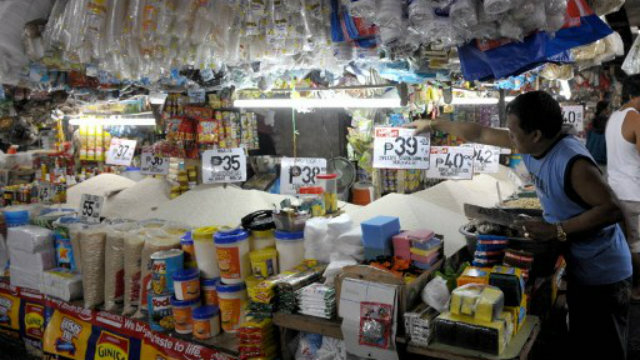SUMMARY
This is AI generated summarization, which may have errors. For context, always refer to the full article.

MANILA, Philippines (UPDATED) – The country’s headline inflation rate in August was at 4.9%, as indices of basic commodities posted higher annual rates, the Philippine Statistics Authority (PSA) said on Friday, September 5.
Inflation, or the price increase of goods and services, was at 2.1% in August last year, but hit 4.9% this year due to the higher annual rates of price increase in a majority of basic commodities.
“Mixed movements in the annual growths among the commodity groups were noticed during the month,” PSA said in its summary inflation report consumer price index on September 5.
Fod prices indices remained high at 8.7% in August, the same rate in July. It was at 1.8% in the same month in 2013.
Food inflation increased by 8.3% in August due to faster year-on-year growth in almost all major food items during the period, followed by clothing and footwear at 3.4%.
“Except for indices of rice, vegetables and food products not elsewhere classified whose annual increments were slower during the month, all the food groups had higher annual upticks,” PSA said.
PSA also reported mark-ups in pork, beef, processed and canned meat in many regions. This caused a 0.7% increase in the meat index in the country in August.
The vegetables index, meanwhile, declined by 1.4% as the PSA noted a sufficient supply of selected vegetables in the markets such as garlic and carrots.
“On the other hand, higher prices of eggplant, tomatoes, chayote, stringbeans, and bitter gourd in NCR markets resulted to a 2.0 percent growth in its vegetables index during the month,” it said.
Price indices of housing, water, electricity, gas and other fuels and furnishing, household equipment and routine maintenance of the house were at 2.7%. The health index was at 3.3%.
The National Capital Region (NCR) experienced the highest price increase rate of food and non-alcoholic beverages, as figures spiked to 8.5% in August. The price index of clothing and footwear in the region was at 4.2% in the region, while prices of housing, water, electricity, gas and other fuels rose to 2.4%.
The PSA also reported a slowdown in price increase in the transport and restaurant sectors, and miscellaneous goods and services.
The slower mark-ups in the said commodity groups caused general prices in the country to increase at a slower rate when compared month-on month, said the PSA.
Core inflation in the country was at 3.4% in August.
NEDA: ‘Prices to normalize’
National Economic and Development Authority (NEDA) Director-General Arsenio M. Balisacan said in a statement that food prices are seen to “normalize” once government rice importation kicks in, among others.
“Food prices, while expected to remain elevated, are seen to normalize as government steps up its rice importation,” Balisacan said.
He added that the commencement of the harvest for main season corn is seen to provide an additional buffer to supply. It is expected to be completed by mid-September.
“Given the potential upside pressures linked to possible increases in food and oil prices and pending petitions for adjustments in utility rates, short term interventions should focus on ensuring supply sufficiency of key commodities,” the NEDA chief said.
Balisacan said that a “timely” rice importation is warranted to augment local production in view of the expected 1.2% decline in domestic palay production in the second half of 2014.
“The relatively high probability of El Niño towards the fourth quarter of 2014 implies that the government should intensify efforts to implement programs that will help the areas which are highly and moderately vulnerable to the adverse impact of a dry spell,” said Balisacan.
He also urged the speedier implementation of pest control measures against the “cocolisap” – which is hurting the coconut industry – considering the importance of coconut products in the production of many food and non-food manufactures for domestic consumption.
Balisacan said that “notwithstanding upward pressures on prices, the overall market expectations on inflation remain well-anchored,” and cited the recent policy action of the Bangko Sentral ng Pilipinas.
“Such policy action by the Bangko Sentral ng Pilipinas is expected to put a brake on potential price pressures,” he said.
Balisacan was referring to the Monetary Board’s recent move to hike interest rates by 25 basis points to 3.75% for the overnight borrowing or reverse repurchase facility and 5.75% for the overnight lending or repurchase facility. – Rappler.com
Add a comment
How does this make you feel?
There are no comments yet. Add your comment to start the conversation.